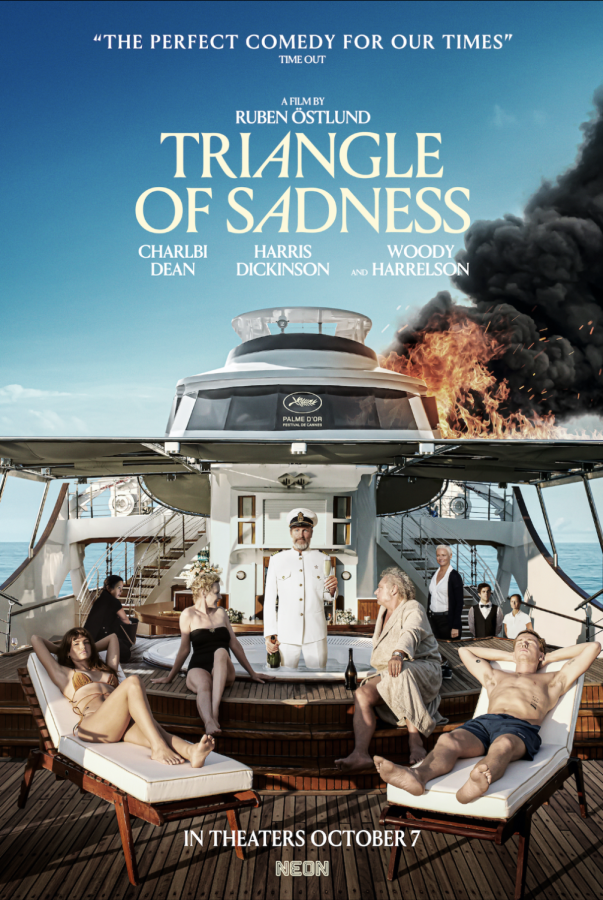Three years ago, Bong Joon-ho’s comedic thriller “Parasite” won the Palme d’Or, the highest prize at the Cannes Film Festival. The following year, it was awarded Best Picture at the 2020 Academy Awards. The film was universally praised for its ruthless and compulsively entertaining takedown of the dangerous social disconnect that comes with exorbitant wealth.
This past May, director Ruben Östlund took home his second Palme d’Or for his film, “Triangle of Sadness.” Like “Parasite,” the film takes a comedic approach to satirizing the clueless upper class. It’s difficult to ignore the parallels between “Parasite” and “Triangle of Sadness,” and even more difficult to ignore how the latter fails to reach the former’s heights.
Östlund’s film follows a group of ultra-rich socialites who set sail on a luxury yacht, experiencing a series of vile mishaps that leave them stranded on a deserted island. With an abundance of slapstick comedy and toilet humor, the film is something of a prestige gross-out comedy. While the film is consistently funny, it ultimately falls short in its satire, making its final message feel smug rather than poignant.
The film is separated into three individually-named chapters: “Carl & Yaya,” “The Yacht” and “The Island.” The first is named for a thin-skinned male model, played by Harris Dickinson, and his emotionally-distant influencer girlfriend, played by the late Charlbi Dean. The film opens at a casting call for male fashion models while a herd of shirtless hunks are being interviewed by a pop entertainment journalist. The scene cleverly jabs at the absurdity of the modeling industry, the interviewer pointing out how expensive brands feature pouty models and more commonplace brands feature smiling ones.
Dickinson plays Carl to perfection, balancing a doe-eyed sincerity with a fundamental lack of emotional intelligence. Even as he makes a series of obviously wrong choices, his desire to understand what’s going on is inexhaustibly funny. We understand where his impulses come from, as little sense as it may make to actually act on them.
Carl’s girlfriend, Yaya, is played by Charlbi Dean, who proves to be just as terrifyingly convincing. Yaya operates in a collection of subtle manipulations, evading dinner bills and focusing more on her Instagram presence than on the yacht voyage she was gifted. As much as the two talk to each other, it is impressive how little they actually manage to communicate to each other. Their nonsensical interplay must be seen to be believed.
The second chapter is the dramatic centerpiece of the film, taking place on a highly exclusive yacht where the high jinks really begins. There, we meet a series of bizarre characters, including a brash Russian manure magnate (Zlatko Burić), an inhumanly cheery head of staff named Paula (Vicki Berlin) and a drunken American socialist captain (Woody Harrelson). When Paula inadvertently schedules the highly anticipated Captain’s Dinner during a storm, the passengers are struck with virulent sea sickness.
Östlund expertly builds the collective sickness with peripheral chaos, whether that be a side character stumbling to their seat or the far-off sound of a sickly belching. The passengers’ determination to keep up appearances jeopardizes everyone’s safety, leaving the ship without proper steering or adequate facilities. Östlund’s immersive direction makes this segment both hilarious and dread-inducing.
On a more heavy-handed note, the manure magnate and the captain have an extended conversation debating capitalism and socialism. The irony is obvious, putting a finer point on the message that had been gracefully, yet comedically building throughout the film. This eagerness to put the film’s ideas into the mouths of his characters ends up sabotaging the greater effect of the story.
The final chapter takes place post-shipwreck, leaving the wealthy survivors in the hands of one of the yacht’s custodians, Abigail, played by the fantastic Dolly De Leon. Though people like Paula and Carl try to assume the leadership role, Abigail’s natural resourcefulness and logic outpace them at every turn.
It would seem that Östlund is making a point about the fundamental difference between the super-rich and the working class. Abigail represents a side of society that they had never thought of as anything more than “the help.” But as the third chapter unfolds, it becomes increasingly clear that Abigail is eager to exploit her position. Without revealing too much, she becomes far more domineering and demanding than she had ever been. By the end, you question if she had any more conscience than any of the other passengers.
There is a place for this sort of broad satire. Films in the past have taken an absurdist approach to the class debate, citing a human-wide idiocy that challenges our notions of civility and sophistication. But in “Triangle of Sadness,” that philosophy doesn’t show up until its final chapter, nullifying the sharp criticism of the wealthy that had made up the rest of its runtime.
It’s at moments like these that I began to think of “Parasite.” That film fore fronted working-class people, highlighting the strange allure of the wealthy and emphasizing the cruelty they wield by simply ignoring their less privileged acquaintances. While the two films are undeniably different stories, the comparison illuminates why “Triangle of Sadness” feels less successful. If the thesis is to criticize all classes, then why not feature those working-class folks in the entirety of the film? It is a shift in perspective that is surprising and interesting, but ends up feeling incongruous, allowing the super-rich off the hook with an apathetic shrug.
“Triangle of Sadness” is essentially two separate films, one wildly successful, and the other far less impactful. The comedy that makes up most of the runtime is superbly entertaining, resulting in one of the most shocking and fun theater experiences I’ve had all year. But the course-corrected satire toward the end of the film proves to be less successful, leaving the film in a sort of unfortunate middle-ground.
Thomas Machacz can be reached at [email protected].



















